Exotic Pets: The Evolving Obsession Around Latin
March 5, 2020
Furry, feathered, scaly or spiky. Pets come in all shapes and sizes, from dogs and cats to bearded dragons and hedgehogs. No matter the species, these unusual pets have an allure that draws in people around the country. While dogs may have become known as “man’s best friend,” other animals are just beginning to become popular in the developing world of pets, particularly among the student body at Charlotte Latin School.
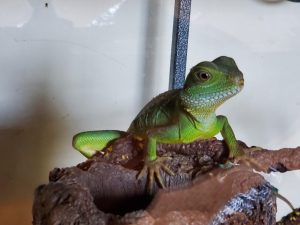
Currently, there is an ever-expanding exotic animal trend for pet devotees across the Latin community. There are many pet enthusiasts who own uncommon pets such as lizards or parrots, but believe it or not, the pets get more bizarre from there. Some Latin students call even the most unconventional creatures (such as snakes and cockroaches) their pets. Molly Clark ‘21 notes there is a special appeal about having a donkey named Richard as her family’s mascot. “Well, I love dogs, but because the donkey is so different than most animals, it makes it more fun and interesting to tell people about him,” Clark said.
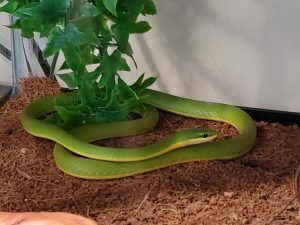
While many Latin students enjoy owning pets for the experience of keeping the pet and the skills of responsiblity that come with it, others enjoy familiarizing themselves with critters of the animal kingdom for later career paths and studies. Students who own one unusual pet find it can lead to a menagerie of unique or peculiar species of varied animals. Jackson Willett ‘20 appreciates the responsibilities of owning such pets and explains why this hobby has become his passion. Willett came across these interesting animals through annual pet shows and exhibits such as SEWE (Southeastern Wildlife Exposition), as well as visiting multiple pet stores across the country. “The animals are different and have cool behaviors, and it is interesting to watch them interact with the bioactive environments I set up,” Willett said, “Most of my pets recognize me and get very excited about feeding time. They are all very aggressive eaters, so it is fun to watch them hunt for their meals.” Willett’s pets range from numerous exotic snakes to predatory
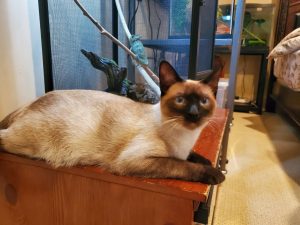
fishes, geckos, frogs and a Chinese water dragon.
The owners must be responsible for caring for the animals in every way; what starts as a casual hobby often evolves into a passion. A daily feeding ritual can turn into very expensive weekly trips to Petsmart for some of these pets. Interestingly enough, many exotic pets cost no more than domestic pets, such as dogs or cats; however, some lizards do require live mice and crickets. According to my experience with my brother’s pets in our family, animal ownership usually begins with one person caring for the pet, but as time goes on, the responsibility increases exponentially.
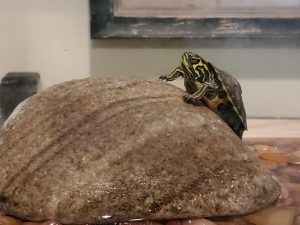
Grandparents and extended family members often provide much of the support and share in the responsibilities. For example, If one of your family members enjoys owning unique pets and finds the task rewarding, then having extended family members share the burden in caring for the pets can help save wear and tear on your home, as well. According to Greyson Gatrell ‘22, his grandmother owns two parrots, so he can enjoy the experience of owning a parrot without the other attachments and cost of food. Some of the most common of the unusual pets include the bearded dragon, boa constrictor, gecko, tortoise, sugar glider, stick insect, macaw, miniature donkey, micro pig and the hedgehog.
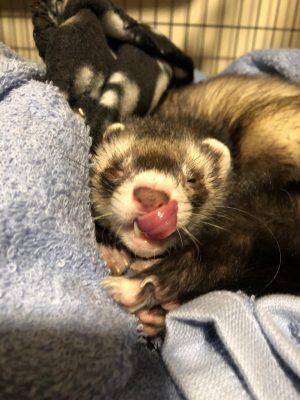
Originating from Australia, the bearded dragon is one of the most common house pets. The term “exotic” refers to a wild animal that is more unusual than the typical dog or cat. Mary Cate Kiser ‘23 talked about her experiences owning a bearded dragon. “She’s nocturnal, so she spends most of her day in a little cave in her cage and walks around and eats at night. Her tail is massive and looks a lot like her head.”
According to the Most 10 Online, while some of this pet trade is legal, often the animals are captured illegally from the wild and born into captivity. Additionally, thousands of wild animals are smuggled into captivity every year. Consumed by the extravagance of owning such exotic pets as snakes, birds, monkeys, tigers and turtles, many people don’t realize the effects of keeping such pets in cages.
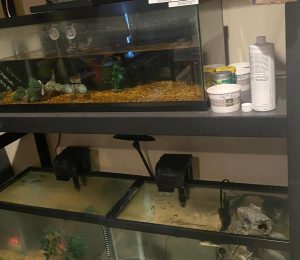
Lauren Kearney of the website One Green Planet explains the significance of keeping these pets in the wild. “Owning your bird, hedgehog, lizard or monkey might seem striking, it might even add a certain color to your personality; but, it is wrong and unfair to keep an exotic animal in your home,” Kearney said. Kearney speaks against humans who aim to keep these animals out of their natural habitats. “No matter how you may try to replicate their environment, their natural instinct is to live in the wild, not amongst four brick walls.” However, some exotic pet owners have found ways to keep their pets happy and to allow them to live within structures and habitats that enable them to feel comfortable and less confined. For example, many pets exhibit nocturnal and other odd behaviors not common to the native pets of the Americas. As a result, many pet owners are familiarizing themselves with such behaviors early on so they don’t become a problem later on.
While many people purchase common housepets because it is more convenient, others are drawn to the exotic pet breeds for their unique appeal. No matter the species, one thing remains the same: all good pet owners are responsible owners who love and care for their pets equally, whether they need special food, habitats or even a commitment to additional funding for their care.

Hayden Willett • Aug 24, 2020 at 2:29 pm
I think this paper was very well written and Tanner should keep at journalism.